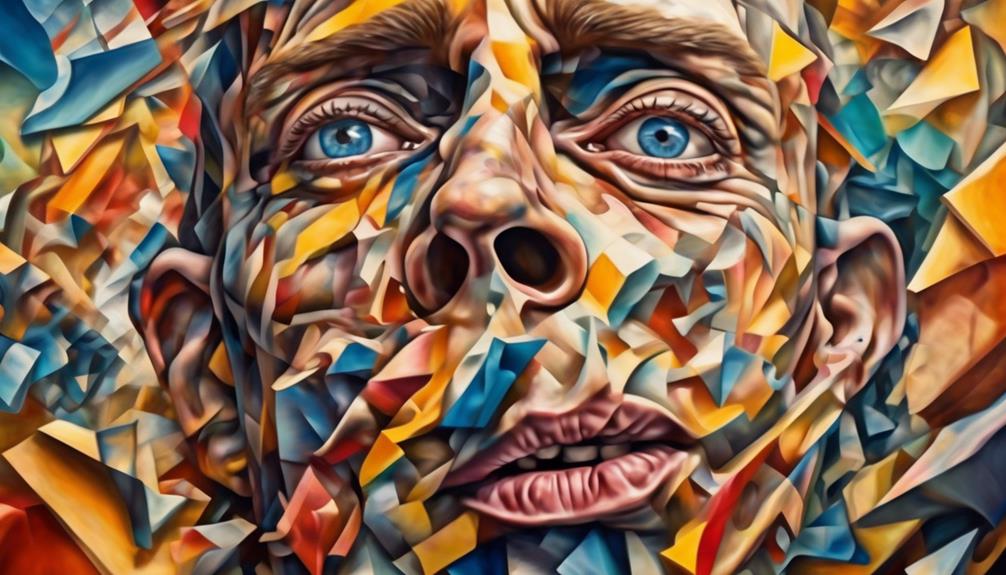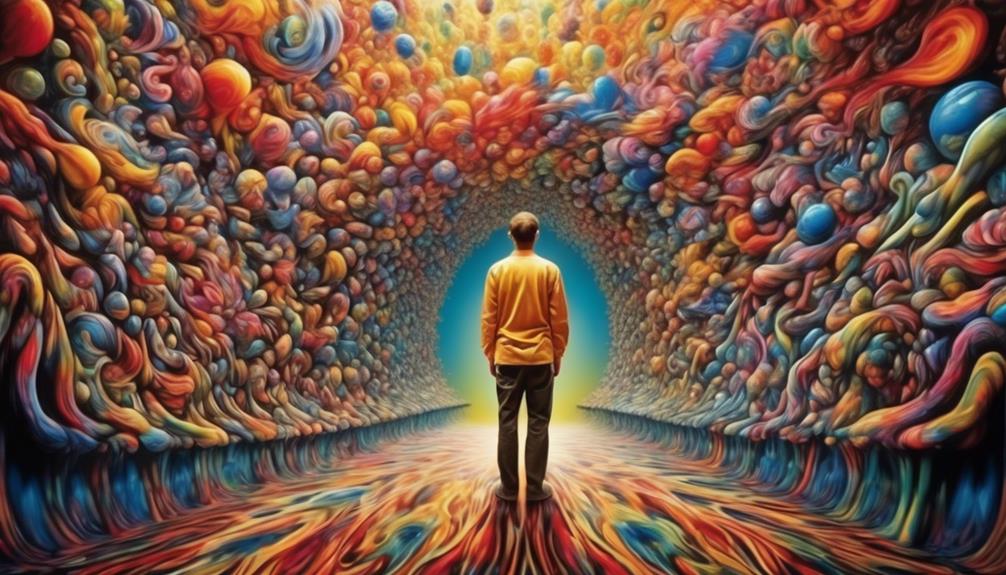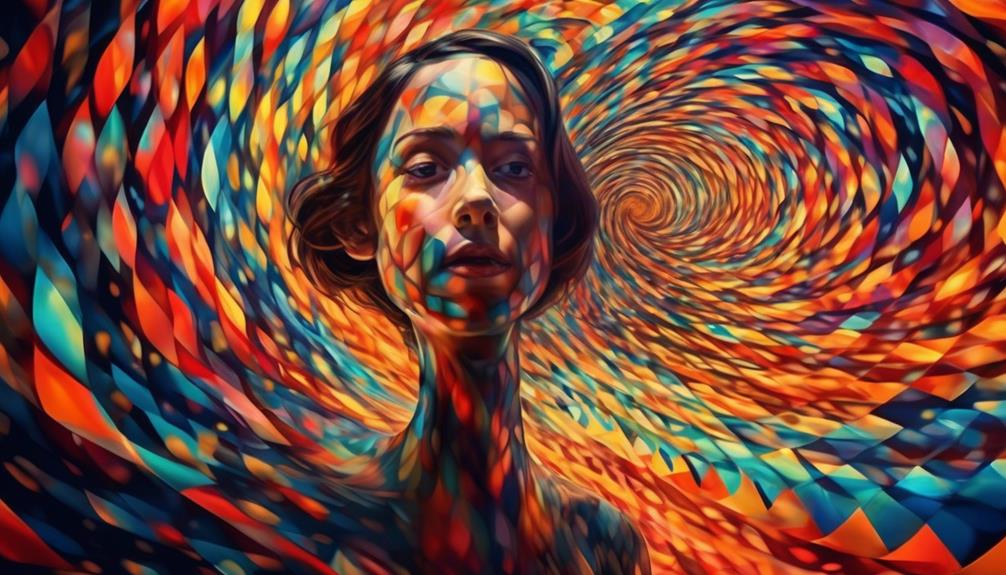Is there a connection between dehydration and hallucinations that intrigues many? Dehydration is often associated with thirst and fatigue, but can it also play tricks on our minds?
As we explore the effects of dehydration on the brain, it becomes evident that the consequences extend beyond physical discomfort.
Let's delve deeper into the complexities of how dehydration may influence our perception of reality.
Key Takeaways
- Dehydration impairs logical thought processes and cognitive abilities.
- Severe dehydration can lead to hallucinations and indicate mental health distress.
- Electrolyte imbalances from dehydration can cause hallucinations and psychotic symptoms.
- Dehydration-induced hallucinations are common among the elderly and require prompt medical attention.
Dehydration's Impact on Brain Function
Dehydration significantly impairs brain function, affecting logical thought processes, motor skills, cognitive abilities, memory retention, and mood regulation. The brain is made up of about 75% water, emphasizing the importance of proper hydration for optimal function.
When dehydrated, the brain cells lose efficiency in transmitting electrical signals, leading to decreased cognitive performance and memory problems. Symptoms of dehydration include confusion, dizziness, and fatigue, all of which can impact daily activities and decision-making processes.
In severe cases, dehydration can even lead to hallucinations and psychosis, especially when electrolyte imbalances occur. It's crucial to recognize the medical implications of dehydration on brain function, as it can have serious consequences, particularly in vulnerable populations such as the elderly.
Understanding Dehydration-Related Hallucinations

In cases of severe dehydration, hallucinations and other psychotic symptoms, such as delusions, can manifest due to electrolyte imbalances affecting neurologic functioning. Dehydration-related hallucinations are a serious sign of mental health distress and may indicate the need for emergency medical intervention. It's crucial to recognize the signs and symptoms of dehydration, such as extreme thirst, dry mouth, fatigue, dizziness, and decreased urine output, as they can progress to more severe manifestations like hallucinations in cases of prolonged dehydration.
When dealing with dehydration-related mental health issues, seeking medical help promptly is essential. Emergency medical intervention may be necessary to address dehydration and its effects on mental well-being. Dehydration-related hallucinations shouldn't be overlooked or dismissed, as they can signify a critical medical condition requiring immediate attention.
Proper medical assessment and intervention can help manage dehydration effectively and prevent further complications in mental health. Understanding the connection between dehydration and hallucinations is vital for ensuring appropriate care and support for individuals experiencing dehydration-related mental health challenges.
The Link Between Dehydration and Hallucinations
Understanding the critical connection between electrolyte imbalances from dehydration and the onset of hallucinations is imperative for recognizing and addressing mental health distress effectively. Dehydration can cause hallucinations due to the loss of essential electrolytes from the body, potentially leading to psychotic symptoms. Recognizing the signs of dehydration and its impact on mental health is crucial for preventing the progression to more severe symptoms like hallucinations.
| Dehydration Symptoms | Psychotic Symptoms | Signs of Psychosis |
|---|---|---|
| Excessive thirst | Delusions | Disorganized thinking |
| Fatigue | Paranoia | Hallucinations |
| Dizziness | Agitation | Social withdrawal |
| Confusion | Irritability | Lack of insight |
Exploring Dehydration-Induced Hallucinations

Considering the impact of electrolyte imbalances on mental health, recognizing the signs of dehydration-induced hallucinations becomes essential for early intervention and treatment.
Dehydration, a common issue among the elderly, can lead to various health conditions, including hallucinations. In older individuals, dehydration is often linked to medication side effects, reduced fluid intake, or certain medical conditions that affect fluid balance.
Hallucinations resulting from dehydration can be alarming and may mimic symptoms seen in psychotic disorders. When caring for an elderly person at home, it's crucial to monitor their fluid intake and watch for signs of dehydration such as dark urine, dry mouth, confusion, and fatigue.
If dehydration-induced hallucinations are suspected, seeking medical attention promptly is vital. Treatment may involve rehydration through oral fluids or, in severe cases, the administration of intravenous fluids to restore electrolyte balance and alleviate hallucinations.
Proper hydration plays a significant role in maintaining cognitive function and overall well-being, especially in vulnerable populations like the elderly.
Dehydration as a Hallucination Trigger
Moving from the exploration of dehydration-induced hallucinations in the elderly, we now focus on the role of dehydration as a trigger for hallucinations.
Dehydration can disrupt the delicate osmotic balance in the body, leading to electrolyte imbalances such as hyponatremia, which can result in hallucinations. This imbalance can manifest in various ways, including auditory hallucinations, where individuals may hear voices or sounds that aren't present.
Furthermore, excessive thirst, a common symptom of dehydration, can be particularly concerning in individuals with psychotic disorders, as it may exacerbate their condition. Dehydration-related psychosis can also contribute to the onset of first episodes of psychosis and may be linked to certain psychiatric conditions.
Caregivers should be vigilant about monitoring hydration levels, especially in individuals with excessive thirst or known psychiatric issues, to prevent dehydration-related complications like hallucinations and psychosis. Staying hydrated is crucial for maintaining both physical and mental well-being.
Frequently Asked Questions
Can Dehydration Cause Mental Confusion?
Yes, dehydration can cause mental confusion.
It can lead to problems with logical thought, mood changes, and difficulties in memory.
Dehydration can result in a loss of electrolytes from the body, affecting cognitive function.
It's important to stay hydrated to maintain optimal mental clarity and overall well-being.
Can Dehydration Cause Strange Behavior?
Absolutely, dehydration can indeed cause strange behavior. When our bodies lack proper hydration, it can lead to shifts in mood and cognitive function. This imbalance may manifest as unusual or erratic actions.
It's crucial to stay hydrated to maintain optimal mental and physical health. Remember, water is essential for keeping our minds and bodies functioning at their best.
What Are the Mental Symptoms of Dehydration?
When dehydration sets in, mental symptoms can manifest. These may include difficulties in short-term memory, changes in mood, and impaired cognitive function. It's crucial to prioritize good hydration for mental well-being, as studies have established connections between dehydration and mental health.
Dehydration can also lead to electrolyte imbalance, potentially causing hyponatremia, which can result in hallucinations or coma. Proper hydration is essential for maintaining a healthy mind.
Can Dehydration Make You Delirious?
Absolutely, dehydration can indeed make one delirious. It's crucial to understand that lack of proper hydration affects our cognitive abilities and can lead to confusion, disorientation, and even delirium.
Our brains rely on adequate water intake to function optimally, so when dehydrated, we may experience difficulties in maintaining clear and coherent thoughts. Staying hydrated is key to ensuring our minds stay sharp and focused.
Conclusion
In conclusion, dehydration can indeed cause hallucinations, particularly when electrolyte imbalances occur.
In fact, studies have shown that up to 25% of patients with severe dehydration may experience hallucinations.
It's crucial to stay hydrated to maintain proper brain function and avoid potential mental health complications. Remember to listen to your body and seek medical attention if you experience symptoms of dehydration.
Stay hydrated, stay healthy.









